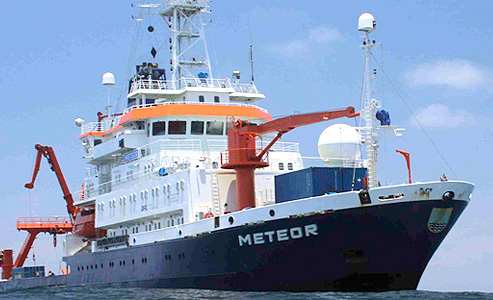Marine Expedition to Brazil Investigates Climate Dynamics
10 June 2015

Photo: Center for Marine and Atmospheric Sciences (ZMAW)
An international team led by Heidelberg University geoscientists will embark on a four-week marine expedition in the Tropical West Atlantic in the spring of 2016 to study historical precipitation changes in Brazil. In March and April of next year, the researchers are planning to collect water and sediment samples along the Brazilian coast and reconstruct the changes in the local precipitation over the past 150,000 years. “This logistically complex expedition aboard the METEOR research vessel will usher in new perspectives on geoscientific research at Ruperto Carola”, explains expedition leader and geologist Dr. André Bahr. The SAMBA project is being funded by the Federal Ministry of Education and Research and the German Research Foundation.
Project partners from the universities of Sao Paulo and Rio de Janeiro are closely involved with the research expedition. Other members of the international team include researchers from the Helmholtz Centre for Ocean Research Kiel (GEOMAR), the Goethe University Frankfurt, and institutions in France, Italy, Luxemburg, and Colombia. SAMBA stands for “South American Hydrological Balance and Paleoceanography during the Late Pleistocene and Holocene”.
Expedition participants will be collecting water and sediment samples near the mouths of rivers along the Brazilian coast between Rio de Janeiro and Fortaleza. “Previous climate reconstructions show that particularly eastern Brazil experienced extreme fluctuations in the geographic precipitation distribution in the Pleistocene and Holocene. That caused abrupt transitions between wet and dry periods, with an equally drastic impact on the local vegetation”, explains André Bahr from the Institute of Earth Sciences at Heidelberg University. According to Bahr, the fluctuations in precipitation in turn depend on the strength of the summer monsoon in South America, which is driven by long-term changes in the amount of solar irradiation and short-term fluctuations in ocean circulation.
“But we still know too little about how the complex interactions between the various regulating factors work”, continues the geologist. “Yet they are extremely relevant in terms of future climate change”. Modern geoscientific methods will be used on the sediment cores collected during the expedition to delve into these regulating mechanisms. Because the core samples will be collected near land, the researchers will be able to correlate continental and environmental fluctuations, such as changes in vegetation, with changes in ocean circulation, thus providing new insight into the climate dynamics of this region.

